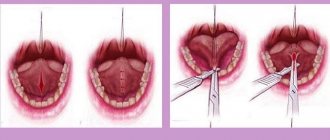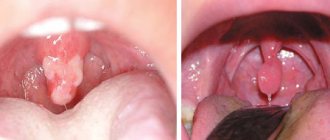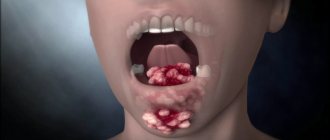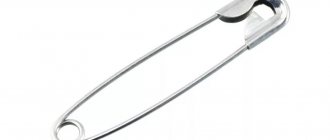The division of the tongue (snake, forked tongue) is called splitting (from the English split - “to separate”). This is an extreme type of body modification, which involves surgically dividing the organ into two parts along the midline, from tip to middle. The purpose of this procedure is self-expression, emphasizing one’s own individuality. Some people resort to this type of body fashion to match fashion and youth trends. Another meaning of splitting is to increase sensuality and expand opportunities in intimate relationships. Kissing and caresses with a forked tongue evoke more vivid sensual sensations in your partner. Most people who decide to split can control the two halves of the tongue separately using muscles.
Background
Surprisingly, such an operation is not something new. It has its own many-thousand-year history, which began literally from the moment of the advent of human civilization. Take yoga, for example. In this teaching, there are ancient practices when the tongue was cut and pulled out in order to later use it in specially designed breathing exercises that allowed a person to cross the line between life and death. In this way, yoga followers could get closer to the so-called Primary Source of all things. By the way, if you look at the images of various ancient Indian deities, you will notice that many of them have forked tongues.
Rule four: help your baby cope with pain
What to do if a child bites his tongue? Make sure that your baby has a minimum of discomfort after this unpleasant moment, because his tongue is not only damaged, but also very painful. Apply any gel to the mucous membrane that is suitable for sore gums during difficult teething. For example, “Kamistad Baby”, “Kalgel”. You can also give your child Nurofen or Panadol, Viburkol - these medications will comprehensively help relieve anxiety, prevent the appearance of fever, and reduce pain.
Painkillers will help your child survive the problem.
“My daughter recently lost all her eye teeth, and against this backdrop, a real nightmare began at home. She bit her entire tongue, sores and grooves appeared on it, the whole tongue was red. We went to the pediatrician, and she told me to use only Stomatidin for prevention and observe, supposedly, my daughter will get used to the new sensations from the grown teeth and it will pass. And I’m afraid that it will become like a bad habit!”
Sofia R., from correspondence on komarovskiy.net
But products such as Lidocaine or eye drops (some sometimes use them for other purposes and even recommend them as a topical anesthetic), which are in the home medicine cabinet, should not be used. These adult medications have many contraindications, have side effects and should not be swallowed, and rarely can any child not swallow saliva and sit motionless with their mouth open until the medicine takes effect.
Progress of the operation
It is immediately necessary to warn that tongue splitting or tongue cutting is a process that requires exclusively professional performance in a specialized salon, where an experienced master will carry it out with the utmost care and without any side effects. The fact is that two fairly large arteries pass through this part of the human body, damage to which can lead to unpredictable consequences. This is why you should never split your tongue yourself.
The operation itself is carried out as follows: the desired part of the body is cut from the tip to approximately the middle. But first, the customer and the master agree on the depth of the tongue incision, after which the entire oral cavity is disinfected and a straight line is drawn. Since this operation is usually performed under local anesthesia, the professional first gives an anesthetic injection and only then cuts with a scalpel at the intended location. Sometimes during the operation it is necessary to trim the frenulum under the tongue. At this stage, this procedure usually ends. But recently, the incision site has become increasingly sutured. This way the wound heals faster and looks more aesthetically pleasing after healing. Tongue splitting looks really very original. Thus, after the incision heals, the person is left with a forked tongue, like a snake.
How to choose a specialist for splitting?
Typically, this type of service is provided by specialized salons that perform other cosmetic and minimally invasive operations - piercings, tattoos. Well-established large salons with a good reputation are the best choice. Before starting the procedure, check how sterile the instruments are. You have every right to do this, do not be afraid to offend the master. In self-respecting offices this should not be a problem, and a specialist will be happy to tell you and even demonstrate tools and equipment for sterilizing instruments. If you have the slightest doubt about the reliability of the master, it is better to refuse his services.
Painful sensations
As mentioned earlier, tongue splitting is performed under local anesthesia, so you will not feel anything during this procedure. Painful sensations will come only after 1.5-2 hours, when the effect of the drug wears off. Most likely, they will be accompanied by swelling with possible bleeding. In order to relieve such unpleasant symptoms, you need to brew immortelle, nettle and yarrow (1 tablespoon of herb per glass of boiling water), then strain and cool the liquid.
It is best to prepare the decoction in advance, since every hour you will need to take two sips, while alternating infusions - take the liquid into your mouth, move your tongue and swallow. It should be noted that the above herbs have wound-healing and anti-inflammatory properties, so they are recommended to be used both externally and internally for at least a week.
It is important to know that healing occurs differently for each person. Therefore, there is also a special solution that prevents inflammation and infection, and also promotes faster healing of wounds.
Causes of wounds
The most common cause of a wound on the tongue is mechanical trauma. A person may burn, bite or even cut their tongue. According to average statistics, tongue injuries are very common in children. Due to their mobility, children are very susceptible to various injuries; often a wound on a child’s tongue is diagnosed with bruises to the head and face, in particular the beard. When a child hits his beard, he gets injured by biting his tongue.
In addition to the mechanical type of injury, the wound may be of the following nature:
- Chemical;
- Physical;
- Symptomatic.
How to treat a wound that appears on the tongue depends on what led to its occurrence.
Mechanical damage
The reasons why a mechanical wound appears on the tongue in an adult are the same as in a baby:
- cut or puncture by cutlery;
- injury from hard food, such as bone;
- biting while eating, jumping, running, having an epileptic attack, or hitting the face or face;
- injury from broken teeth or an untreated filling;
- carelessness of the dentist when filling or pulling out a tooth;
- bite or scratch from a pet.
If there is mechanical damage, a person experiences sharp painful sensations, a wound appears on the tongue, sometimes bleeding. Areas close to the wound may become inflamed and change color. The healing of a mechanical wound depends on how deep it is and how much area it occupies.
Chemical damage
If the injury occurs because a chemical substance, for example, an alkali, an acid, or salts of heavy metals, has come into contact with the tongue, then this is a chemical injury. Under the influence of a chemical agent, a burn occurs on the surface of the tongue. Symptoms of such damage include dark areas, blisters, scarring, and ulcers.
In order to neutralize the chemical, you should immediately rinse your mouth with soda solution in case of burns with acids and water with lemon in case of alkali damage to the tongue. Very rarely, chemical burns are local; as a rule, the pharynx, esophagus, and stomach are affected. Therefore, if a child or adult accidentally tastes chemicals, you should immediately call an ambulance.
Physical damage
Doctors speak of physical injury when:
- A person received a thermal burn under the influence of steam, boiling water, flame, or hot food;
- The victim was struck with electricity, not necessarily in the tongue area; the charge could enter the leg and come out of the mouth;
- The victim was exposed to a large dose of ionizing radiation.
When this type of damage occurs, the pain gradually becomes weaker, which can give the person a feeling of well-being and the non-seriousness of the herb. However, very often, when receiving physical wounds, acute catarrhal glossitis develops, that is, an inflammatory process that leads to rapid swelling of the tongue, which can cause suffocation. Also, complications of physical injuries include abscess and phlegmon of the tongue.
Proper care
With any modification of the body, including something like tongue splitting, the consequences can be very different. Therefore, you should think carefully before deciding on such a procedure. In addition, you need to be prepared that a split tongue will require special attention for several weeks after the operation, since its cut halves may grow together. To prevent this from happening, some people insert retainers. But this method is not suitable for everyone, as it can cause both additional pain and bleeding. The easiest way is to separate the halves every hour for 3-4 days with thoroughly washed hands. Over time, this can be done with simple muscle effort. In addition, you will also have to wake up several times a night in order to move your tongue.
First rule: inspect the extent of the damage
Children are very active and restless, so the situation when a child bites his tongue is quite common. For example, with the smallest children, trouble could occur even in the process of learning to walk, when the kids take their first steps. With older children, the reason may be active play, sports, talking while laughing and eating, or pampering. But whatever the reason, children of any preschool and primary school age react quite sharply to such trauma; they begin to cry and be capricious. For any caring parent, this behavior causes panic. However, on the contrary, you need to calm down and try to distract the child in order to conduct an oral examination.
“The reason that a child might bite his tongue is sometimes not only the consequences of everyday life. The problem could also arise due to malocclusion or dental problems (for example, abnormal wear of teeth). If the teeth are positioned incorrectly in the oral cavity (in particular, with a distal and mesial bite), then they can often provoke injuries to the mucous membrane, injure the lips and the inside of the cheeks, and the tongue. Therefore, be sure to show your child to the orthodontist at a very early age, especially if this situation is repeated more than once,” says E.A. Kuznetsov, orthodontist.
Small children begin to cry and be capricious.
When the first tears have passed, bring the baby to a window or light source, ask him to open his mouth and carefully examine the mucous membrane: the injury may be located on the tip, back of the tongue, or on the outer, inner or lateral surface. It is necessary to assess the size and depth of the damage, the presence of swelling and hematomas, in order to understand whether the situation requires an emergency visit to the doctor or at first the baby just needs to be given first aid and observed.
Temporary inconvenience
First of all, they are that it will be painful to eat for the first few days. Most people do not eat anything at all during the first 24 hours after surgery. Later, you can take liquid food, for example, meat or vegetable broth, drinking yogurt, etc. But the main aspect is oral hygiene, which must be done after every meal, even liquid food.
Temporary inconveniences also include the effect of a cut tongue on diction. Until it heals, some sounds will be a lisp, which is quite natural. To restore normal speech, you will have to do various articulation exercises in order to learn again, as before, to cope well with your new model of language. Over time, diction will certainly acquire the same clarity of sound.
Rule seven: pay attention to the complex of concomitant diseases
As experts say, injuries to the tongue, as well as to the inside of the cheeks and lips, do not always occur in a child due to activity and restlessness. Sometimes they indicate the presence of some undetected diseases, especially if the situation repeats itself again and again. For example, the cause may be the presence of bite pathologies, abnormal attachment of the frenulum of the tongue, paresthesia (decreased sensitivity of nerve receptors). In the first two cases, an orthodontist, dentist, or pediatric surgeon will help solve the problem. If you have paresthesia, you will need to visit a neurologist, endocrinologist, and other specialists.
Notice
: Undefined variable: post_id in
/home/c/ch75405/public_html/wp-content/themes/UltraSmile/single-item.php
on line
45 Notice
: Undefined variable: full in
/home/c/ch75405/public_html/wp-content /themes/UltraSmile/single-item.php
on line
46
Rate this article:
( 3 ratings, average: 3.67 out of 5)
language
Consulting specialist
Kuznetsov Egor Andreevich
Doctor rating: 9 out of 10 (3) Specialization: Orthodontist Experience: 14 years
Split language: reviews
In various modern subcultures, which include punks, bodysuits, emo and others, having a forked tongue is considered an indicator of “coolness”, distinguishing a person from the mass of ordinary people. Split tongue (photo) is popular among young people under 25 years of age. Sometimes people who do not belong to any of the newfangled trends decide to make such a modification, but only want to emphasize their unusual individuality in the intimate sphere.
Reviews of bilingual tongue surgery vary significantly. For some, wounds heal faster, for others it is extremely slow and painful. In addition, the attitude towards a person with such an unusual body part in society is ambiguous. As numerous surveys show, most people find splitting unpleasant or outright disgusting. But as you know, taste and color...
Before deciding on such a modification, you need to know that if a person wants to return his “integral” language, this may turn out to be almost impossible. From a medical point of view, such an operation will be too long and painful, and besides, it will not be possible to fully restore the previous length, mobility and agility, so quite serious problems with speech may appear.
Types of congenital anomalies
Currently, in medicine and dentistry in particular, a specific list of main pathologies is identified, each of which has its own deviations. Anomalies of the development of the main organ of the oral cavity include the following disorders:
- aglossia is a rare anomaly in which the tongue is completely absent,
- microglossia - the absence of the front part of the organ, due to which it has an abnormally small size, becomes too short,
- macroglossia - in this case the organ grows excessively, which is accompanied by generalized hypertrophy of the jaw muscles,
- splitting - its two parts are separated vertically, they simply do not grow together, remaining completely separate from each other. This tongue resembles a snake's,
- lingual tonsils - enlarged lymph nodes in the root area of the organ,
- rhomboid glossitis - characterized by the formation of an inflamed area in the shape of an oval or diamond at the base, usually blue-red in color,
- folding is a defect in size and shape, in which deep grooves and folds covered with papillae appear on the surface of the organ,
- a villous (hairy) tongue is a rather rare phenomenon, leading to hardening of overgrown filiform papillae. As a result, the area at the root turns brown or even black,
- Tongue goiter is a pathology in which thyroid tissue develops inside the organ and manifests itself as an uneven surface.
Modern medicine in most cases corrects such defects - in such situations, the problem of aesthetics and functionality is solved through surgery and plastic surgery.
WITHOUT MALES
Lizards have occupied a very important place in scientific research.
For example, while studying lizards, scientists discovered the phenomenon of natural parthenogenesis among terrestrial vertebrates. What is parthenogenesis and why was its discovery in lizards revolutionary? Parthenogenesis is reproduction without the participation of males and is a fairly widespread phenomenon in the animal world. There are many known species of animal worms, mollusks, insects, crustaceans and other invertebrates that reproduce normally without the participation of males, and often they do not have a male sex. As for highly organized vertebrates, it was believed for a long time that same-sex reproduction was impossible in them.
Comments
I read your article and a question came up a little off topic, but close. I recently had my teeth treated by a dentist, had crowns put in, and after that I started constantly biting my tongue. Why is this happening?
Alla (03/06/2019 at 11:40) Reply to comment
- Dear Alla! If the doctor did his job poorly, for example, poorly fitted and installed the crowns, or they were made without taking into account your anatomical features and the state of your bite, then yes, you can injure your mucous membranes and tongue because of this. If this situation occurs on an ongoing basis, then be sure to see the dentist and orthopedist who installed the crowns. Doctors will assess the situation and offer options for solving the problem, but if the crowns are already fixed with permanent cement and it is because of them that troubles occur, then they will have to be completely removed and new ones made.
Editorial staff of the portal UltraSmile.ru (03/09/2019 at 08:47) Reply to comment
Write your comment Cancel reply
3D Smell
The snake's forked tongue can collect scent information in two places at once. The tips of the tongue can cover a distance twice the size of the head
This is very important because it allows them to detect more chemicals in the environment and gives the animal a sense of direction, in other words, snakes use their tongue to pick up smells in three dimensions. For example, owls use their asymmetrical ears to detect sound in three dimensions.
Snakes and owls have similar neural networks that help compare signals from different sides of the body and determine their direction using smells or sounds. Human hearing is also designed for these purposes, but it is less effective.
Once upon a time there lived a shepherd who spent all his life as a shepherd. One day, while tending a flock, he fell into a snake hole and found himself in a dungeon. There in the dungeon lay a snake like a ridge. She was the leader of the snakes.
By the will of fate, the shepherd spent the whole summer in the dungeon. When autumn arrived, snakes began to gather here. Here at the exit lay a large stone. Crawling into the hole, all the snakes licked the stone.
“Well,” thought the shepherd, “let me lick him too.” As soon as he touched the stone with his tongue, the shepherd did not want to drink or eat. The shepherd, having licked the stone, suddenly began to understand the snake’s language.
There lived a shepherd among the snakes and understood everything that they were talking about among themselves. So he spent the whole winter with them.
Summer has come. The time has come for the snakes to come to earth. Before leaving, the snake leader taught all the snakes:
On the ground, do not touch either livestock or people! All the snakes left the hole and crawled out onto the ground. But the leader of the snakes did not let go of the shepherd. The next autumn came. The snakes began to gather in the hole again. Before entering the hole, all the snakes licked the stone. Different snakes with their leaders were located in their own corners.
The shepherd lived with the snakes for exactly three years, and in three years he learned the languages of all the snakes, birds and animals. Three years later, the leader of the snakes released the shepherd and told him not to say that he understood the language of animals. Otherwise he will die.
Again the shepherd began to graze the cattle. At noon each time he drove his herd to rest to a large oak tree. So one day he drove the cattle to the same oak tree, and he lay down to rest under it. A crow flew to the top of an oak tree and said to itself:
“What a shepherd! He has been grazing his flock for twenty-five years, and still does not know that gold is buried under this oak tree in a forty-bucket barrel.”
The shepherd was just dozing under the oak tree, and therefore he heard all the words of the crow. The shepherd woke up, drove the flock away, then dug out a forty-bucket barrel of gold from under the oak tree.
The shepherd got rich. With this money he built himself a new house, bought all sorts of cattle, and then got married. The wife turned out to be healthy and fat.
One day a shepherd harnessed a couple of horses to a tarantass and went with his wife to the market. On the way, the horses began to talk to each other. The shepherd sat and listened to what they were talking about.
Only I,” says one of them, “pull the tarantass, but you don’t pull at all, pull harder.”
“Look back,” says the other. “There’s a woman sitting on your side, a healthy fat woman, and on my side is her thin husband.” That's why it seems to you that you are pulling harder than me.
Hearing the horses talking, the Mari couldn’t stand it and laughed. The wife, surprised, asked her husband:
Why are you laughing?
“Just like that,” the husband answers.
The wife became stubborn and wanted to find out why her husband was laughing.
Husband says:
Let's buy some rolls at the market. Let's return home, feed the cattle, and then tell you what I laughed at.
The husband and wife returned home. Mariets gave the rolls to the chickens and the dog. The dog did not eat, she was grieving. The chickens and rooster began to peck. And in front of the dog the roll lay untouched.
The rooster, seeing that the dog was not eating, asked her:
Why do not you eat?
“We don’t feel like eating, because our owner will die soon,” says the dog.
Of course, he will die, since he does not find justice for his wife alone. I have twelve wives, and I hold them all in my hands. He only has one, and he can't handle it. He has nothing to grieve: he has a twelve-sided whip hanging in his cage. If only he could whip his wife with this whip, saying: “Are you going to ask more questions about what you shouldn’t ask?”
Mariets stood right there and heard the conversation between the rooster and the dog. Then he took the twelve-sided whip from the cage and went in to his wife.
Are you going to ask me more?! - he repeated, whipping her. And he whipped his wife until she said: “Okay, I won’t ask any more questions.”
After this, the husband and wife began to live together.











